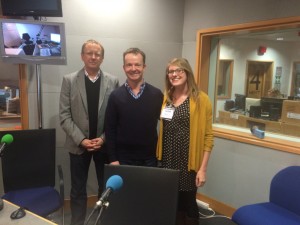Paris, flooding and sceptics: Leeds academics talk climate change

The viability of the Paris Agreement's ambitious long-term target of 1.5C was the subject of an interview with two University of Leeds climate academics on Paul Hudson's Weather Show on BBC Radio Humberside on 30 January (repeated 1 February, BBC Radio Lincolnshire).
Prof Andy Gouldson, Professor of Environmental Policy and Harriet Thew, Postgraduate Researcher in the Sustainability Research Institute, both of whom attended the United Nations climate conference, gave their individual impressions of the global summit. They also discussed raised public awareness of climate change impacts caused by the Boxing Day floods and climate sceptics in the media.
'The fact that we got such a good agreement [in Paris] was a big step forward,' said Andy Gouldson. The language around keeping temperature rise to 'well below' 2C and 'pursuing efforts to limit it to 1.5C' was 'a very good compromise which was quite ambitious' he says, as it appealed to smaller countries and island states as well as countries that wanted a more lenient target.
Asked by presenter Paul Hudson if the target was achievable in practice, Andy Gouldson suggested that the 1.5c target is really challenging. 'I think we can stay within 2C and then work backwards after that towards 1.5, especially as technologies come through that limit warming in the longer term.'
Harriet Thew's experience of the UNFCCC conference, of which she is already a veteran - she has taken part in seven in her former role as Global Environment Manager of an international youth organisation – highlighted the frustrations that are built into the UN process. She described seeing concepts on human rights and intergenerational equity that her young research participants had championed going in to draft text and then being taken out of the agreement as 'emotionally draining' and admitted that, by the time the final text was agreed, she was 'sitting on the floor eating chocolate' in their youth hostel rather than mixing with the high-fiving crowd at the conference.
The wide-ranging interview with presenter Paul Hudson also covered the record-breaking rainfall and flooding in the North of England in December and whether it has made climate change - often seen as being removed in time and space - a more relatable concept. Harriet Thew, who has previously worked with communities vulnerable to flooding, agreed that that it had, but cautioned, 'We also need to know what people can do about it’. She called for more leadership from the government on public engagement and awareness raising, work that used to be carried out by the Environment Agency but which has been substantially reduced following cuts to funding.
The issue of climate sceptics was also raised by Paul Hudson, who noted that, despite 97 per cent of scientists agreeing over climate change, maintained a loud voice in the press. Professor Gouldson responded that, while vocal, 'that lobby have been much better at undermining things than coming up with some alternative explanation - and the reason for that is that there isn't one. It is man-made climate change, which is real.'
The broadcast comes ahead of a major public debate at the University of Leeds on Wednesday 3 February called Unpacking the Paris Agreement: Is it Enough to Limit Dangerous Climate Change? The free event, which has already seen over 350 tickets snapped up, features a panel of four Leeds climate experts including Prof Piers Forster, Professor of Physical Climate Change and Director of the new Priestley International Centre for Climate and Prof John Barrett, Professor of Energy and Climate Policy, as well as Prof Gouldson and Harriet Thew.
The debate, which takes place at the Conference Auditorium at 7.00pm, is presented by the Royal Meteorological Society Yorkshire Centre with the Centre for Climate Change Economics and Policy and the Priestley International Centre for Climate. Due to the high level of interest, advance booking is required to reserve places.
(This edition of Paul Hudson's Weather Show can be heard until 29 February)
